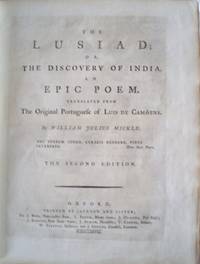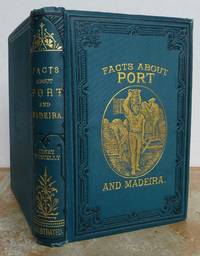
The Lusiad; or, the Discovery of India. An Epic Poem. Translated from the Original Portugese of Luis de Camöens. The Second Edition
by Mickle,William Julius
- Used
- good
- Condition
- Good
- Seller
-
Norwich, Norfolk, United Kingdom
Payment Methods Accepted
About This Item
Quarto, contemporary tree calf, edges worn, rebacked, red morocco label, (2) + ccxxxvipp + 496pp, including the dedication to the Duke of Buccleuch, engraved frontispiece, folding engraved map.
Goldsmith 11720. Viner, Guide to John Rae’s Life of Adam Smith pp.70-74. Not in Kress or Vanderblue.
Second edition, but the first to contain this critical attack on Adam Smith’s laissez-faire doctrines to the East India Trade in the Wealth of Nations. The long criticism appears on pages clxi-clxxxvi and begins; "Of the example of Portugese Asia cannot be better enforced by an examination of the popular arguments relative to the British commerce with India. A recent Writer on the Nature and Causes of the Wealth of Nations, has stood forth as the philosophical champion for the abolition of the Monopoly of the English United East India Company…"
Mickle, a Scottish poet and translator of Camöens epic verse, dedicated The Lusiad to Adam Smith’s pupil the Duke of Buccleuch, who apparently said that it had not the merit it had been presented to him as having.
Viner writes "Mickle’s criticism of Adam Smith’s economics was not limited to Smith’s specific applications of his general laissez-faire and free competition doctrines to the East India Company issue, but included a frontal attack on these doctrines themselves…It was not Smith’s custom publicly to acknowledge, still less, formally to reply to, or to make explicit concessions to, adverse criticism of himself or his writings, and he seems never publicly to have referred to Mickle. Although in the third edition (1784) of The Wealth of Nations he introduced new material on the East India Company and its history which was on the whole even more critical than his original attack on the Company…"
Details
- Bookseller
- Hamish Riley-Smith Rare Books
(GB)
- Bookseller's Inventory #
- biblio34
- Title
- The Lusiad; or, the Discovery of India. An Epic Poem. Translated from the Original Portugese of Luis de Camöens. The Second Edition
- Author
- Mickle,William Julius
- Book Condition
- Used - Good
- Quantity Available
- 1
- Publisher
- Jackson and Lister
- Place of Publication
- Oxford
- Date Published
- 1778
Terms of Sale
Hamish Riley-Smith Rare Books
About the Seller
Hamish Riley-Smith Rare Books
About Hamish Riley-Smith Rare Books
Rare book specialist Hamish Riley-Smith, who died on August 10, did not originally intend to become a dealer.
He went to Trinity College Dublin, where he read economics and met our mother Brigitta (Gita) von Wagner. He planned to work in the family brewing business, John Smith's, and spent seven years learning the craft at Whitbread's. But after all the family interest in John Smith's was sold in 1972, he looked for a new career.
In 1974 he started Hamish Riley-Smith Rare Books. He had no formal training in the book business, other than an acute awareness of business and a degree in economics. He started, in his own words, as a runner, taking one book to another dealer and making a small margin.
Hamish quickly realised this was not for him and started to focus on Arabic and economic books and the social sciences. Through knowledge and research he built up a strong and friendly working relationship with the Japanese, travelling to Japan often. He also traded in Arabia, the US and Europe.
Sacks of catalogues
We can remember how sacks of catalogues would leave the house and go off to museums and institutions across the world, and answers would come back via telex. This was a world before the internet, mobile phones and faxes and computers were only just coming in.
Among his proudest sales were the 14th century Qur'an manuscript of Mameluk Sultan Al Malik Al Nasir Muhammad (pictured here); The Papers of Sir Roy Harrod; The library of Sir John Hicks; The Betjeman Library; typescript/manuscript of Ludwig Wittgenstein's Tractus Logico Philosophicus; The Felibriges Library of Musée Theodore Aubanel, Avignon; as well as collections of Isaac Newton; John Locke; Thomas Hobbes; Shakespeare; William Petty; Robert Owen and Adam Smith.
He was resolute in his independence and had many friends and colleagues in the book business, but he never did a book fair ("I am not a book fairy") and refused to join any trade associations.
He will be remembered by the family as a loving husband, father and grandfather, and a great source of fun and interest; for Hamish, above all, family came first. His business will continue to be run by his wife Gita and two sons, Damian, director of Paragraph Publishing, and Crispian, director of Crispian Riley-Smith Fine Arts Ltd.
Glossary
Some terminology that may be used in this description includes:
- Calf
- Calf or calf hide is a common form of leather binding. Calf binding is naturally a light brown but there are ways to treat the...
- Rebacked
- having had the material covering the spine replaced. ...
- New
- A new book is a book previously not circulated to a buyer. Although a new book is typically free of any faults or defects, "new"...
- Edges
- The collective of the top, fore and bottom edges of the text block of the book, being that part of the edges of the pages of a...
- Morocco
- Morocco is a style of leather book binding that is usually made with goatskin, as it is durable and easy to dye. (see also...







